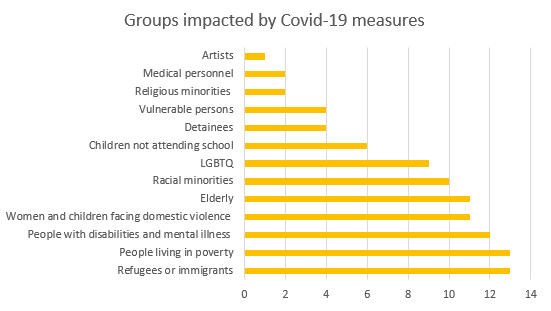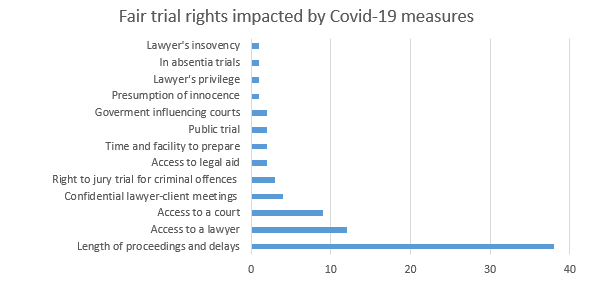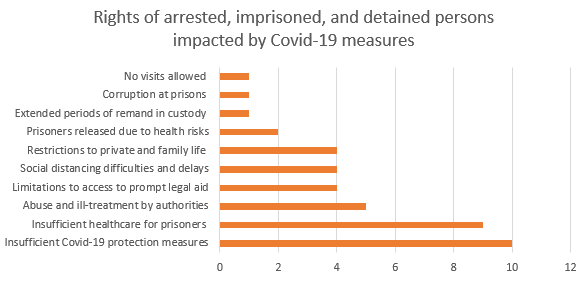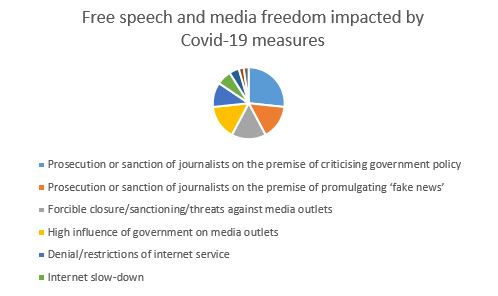Introduction
From March 2020 onwards, the Covid-19 pandemic paralysed Europe and the whole world, with numerous governments moving to enact emergency laws as a response. Needless to say, a number of those laws directly impacted the human rights and rule of law in different jurisdictions, often raising concerns as to their necessity and proportionality.
The IBA’s Human Rights Institute (IBAHRI) launched a survey to assess that impact. Through the responses of the legal practitioners from around the world, we collected first-hand information on the new measures, as well as their impact. Below we provide a short overview of the research.
Overview
While it is recognised that many governments have had to introduce special measures to address the Covid-19 pandemic, and that some of these would necessarily encroach upon rights and freedoms in the interests of national health and wellbeing, it was still important that any such measures were time-limited, proportionate and exercised with care.
The IBA survey collected information from 38 different jurisdictions all over the world. A number of respondents shared their experience regarding the actual impact of those laws for their professional work, and the rule of law situation in general.
Most affected groups
The responses received through the online survey revealed that the emergency measures in the context of Covid-19 had a particularly great negative effect on certain groups of society. Refugees and immigrants, as well as people living in poverty were among the most strongly affected. Lawyers reported that the measures ‘affected mainly the most economically depressed sectors, a population that lives from day to day and that from one moment to the next could not continue generating their daily income’. Some lawyers even reported ‘illegal measures taken by the authorities against immigrants’ in the pretext of the crisis, and that it was impossible for migrants to ‘apply to authorities or courts’ regarding those measures.
Second came people with disabilities, in particular people with mental health issues, as it was reported that ‘they could not get material support’, nor any other support for that matter, which is much needed in the time of crisis and when dealing with any mental health issue.
The third position was again shared by two groups – women and children facing domestic violence threats, and the elderly. A number of IBAHRI survey respondents confirmed that ‘lockdown measures have reportedly led to an increase in domestic violence’.

Fair trial guarantees
When it comes to the impact on fair trial guarantees during the Covid-19 pandemic, the emergency measures had the biggest impact on the length of proceedings, as they caused massive delays. Reportedly, ‘most courts have simply not functioned at all’. This in itself was of concern to lawyers as they were worried about the outcome of the postponed trials ‘as witness memories fade’.
In some jurisdictions, the court proceedings were moved online. However, lawyers reported that ‘for some people, the shift to online communication will make it more difficult to participate in legal activities and proceedings. The ability to effectively access and utilise online services relies on the existence of several factors, such as home access to internet, the physical ability to use online devices, internet and technological know-how, and willingness and/or capacity to learn how to use the internet as a source of information’.
In addition, access to a lawyer became more difficult to respect and implement, as did access to courts in general. This left people ‘sitting in custody with no trial date in sight’.

Right to liberty and security
We have also looked into how the Covid-19 crisis impacted the rights of arrested, imprisoned or detained persons around the globe. The majority of the surveyed lawyers responded that their countries had insufficient health protection measures in places of detention, with regards to safeguarding the wellbeing of the detained people, as well as staff. Almost as many said that there was insufficient healthcare for prisoners altogether.
Also, due to the situation caused by the Covid-19 pandemic, lawyers reported an increase in abuse and ill-treatment incidents by the authorities against people in their custody. Lawyers also observed that due to this crisis, ‘many complaints of torture or beatings by police remained unanswered’, which further contributes to custodians’ impunity and discourages victims from reporting or seeking help. Also, as indicated in the chart below, significant limitations to access a prompt legal aid were reported by lawyers as well.

Freedom of expression
When it comes to free speech and media freedom, numerous respondents reported related restrictions adopted in the context of Covid-19, or violations of these rights altogether. The most commonly reported violation was the prosecution of journalists or media on the premise of criticising governments and their actions. Journalists were also prosecuted or sanctioned on the premise of disseminating ‘fake news’ around Covid-19. Some lawyers reported observing ‘an attitude of intimidating and disqualifying journalists under the premise of promulgating "false news" or criticizing <…> government policy’. Furthermore, in some jurisdictions lawyers reported that ‘journalists are attacked, harassed, including attacks by unknown persons. Independent media and social media sites and social media accounts were blocked’.
This crisis also witnessed attempts by less democratic regimes to block or limit internet access altogether. Since March 2020, the IBAHRI raised concerns over such attempts and practices in Belarus, the Indian state of Jammu and Kashmir, Iran, Myanmar, Togo, Turkey and others.

Right to privacy and personal data
The emergency measures also had a significant impact on protection of personal information, or people’s privacy, in the context of Covid-19. Lawyers from 16 different jurisdictions responded that their governments had accessed personal information on mobile phones during the Covid-19 pandemic, potentially without sufficient legal ground. A number reported that special tracing applications were introduced by their governments, which raised certain ‘privacy concerns’, and‘big debate over [Covid-19] tracker app’ among the legal community.
Others had imposed restrictions on the right to private life, such as prohibiting leaving home without permission via text message and transfer of personal data on personal phones to a state-owned company. These actions again raised concerns with the respective legal communities in relation to the proportionality, necessity and the legitimate aim of such restrictions.
Other restrictions and limitations
In addition, the respondents indicated that the emergency measures also enabled police harassment on the streets; impacted citizens’ right to free election where the elections were held in the midst of the pandemic and without respecting the international standards; and led to discriminatory treatment of transgender people where lockdown timetables were based on gender. In total, lawyers from 17 jurisdictions indicated violations of some sort carried out by their governments in the context of Covid-19.
Summary
The IBAHRI survey revealed that the emergency laws affected various social groups differently. More disadvantaged and marginalised social groups, such as refugees, migrants, people living in poverty, and in certain cases women and children were more severely impacted and felt stronger negative consequences as a result of the Covid-19 emergency measures. Furthermore, the Covid-19 response measures prolonged the trial proceedings and caused lengthy delays, creating difficulties in securing access to a lawyer as well as access to courts in general. Lawyers also reported insufficient health and wellbeing protection measures introduced in detention centres and insufficient healthcare for detainees in general. Increase in abuse and ill-treatment incidents by the authorities was also reported by lawyers. Sadly, the crisis was heavily exploited by many governments to limit free speech, as limitations were imposed based on the premise of criticising government and their actions, or disseminating ‘fake news’ around Covid-19. Numerous attempts to block or limit internet access altogether were also observed. In addition, the emergency measures impacted people’s privacy as numerous tracking and surveillance initiatives were introduced and used, often without proper proportionality, necessity and legitimacy.
Conclusion
Though no lawyer will disagree that certain legal and practical limitations need to be introduced to combat a globally sweeping pandemic, the degree to which they restrict or altogether deny fundamental human rights and freedoms has to be rightly questioned. If the legitimate aim of the protection of public health seems to satisfy one of the conditions of restrictive measures, further tests of proportionality and necessity must still be applied and diligently met. In crisis times like these, principles of proportionality and necessity are as important as ever, in order to safeguard and maintain functioning democracies respecting the rule of law.
The IBAHRI survey, which includes responses from 38 different jurisdictions worldwide, illustrates that often these tests were forgotten or purposefully abandoned by governments in order to impose certain restrictions on ‘inconvenient’ human rights and strengthen political powers. Such practices had a strong impact on certain groups in society and their rights. The restrictions also further weakened the general status of the principle of the rule of law and contributed to the growing ignorance, and sometimes open disrespect for it, as well as other basic democratic norms and standards.